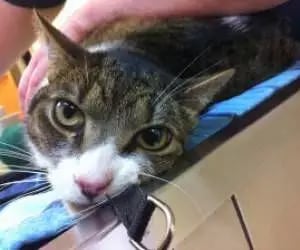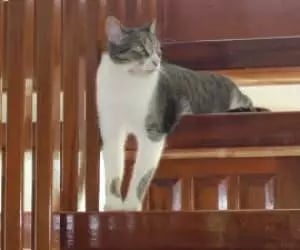Mako
Vestibular Disease
Home » Case Studies » Mako


Mako, a 4-year-old neutered male Domestic Shorthair (DSH) presented to Southeast Veterinary Neurology (SEVN) for evaluation of progressive vestibular disease. Mako is an indoor/outdoor cat from the Florida Keys. He was normal prior, was current on vaccinations, and was fed a balanced diet.
Three weeks prior to presentation at SEVN, Mako was outside and was attacked by a cat. There were no visible wounds at the time and he seemed to be fine. A couple of days after the fight, the owner noticed a wound on Mako’s neck. He was treated at his local veterinarian with systemic and topical antibiotics and received booster vaccinations. A head tilt to the left was noted.


At follow-up examinations, the wound was healing nicely and antibiotics were continued. The head tilt had resolved. The evening of the recheck examination, the owner let Mako outside for the night, but noticed that Mako’s eyes “looked funny in the corners – there was a flap of skin that was crossing over the eye”, presumably the third eyelid. He did not return the next morning as was his custom and he was seen on the property lying close to a large iguana. He returned that evening around 10 p.m. and was noted to “walk slowly and wobble a couple of times. He flopped down halfway into the house.” He was taken back to his family veterinarian who examined him and called SEVN.
On examination, Mako was mentally dull. He would respond to stimuli but was not as alert or responsive as a normal cat. He crouched low to the ground and had a head bobble and a truncal sway.